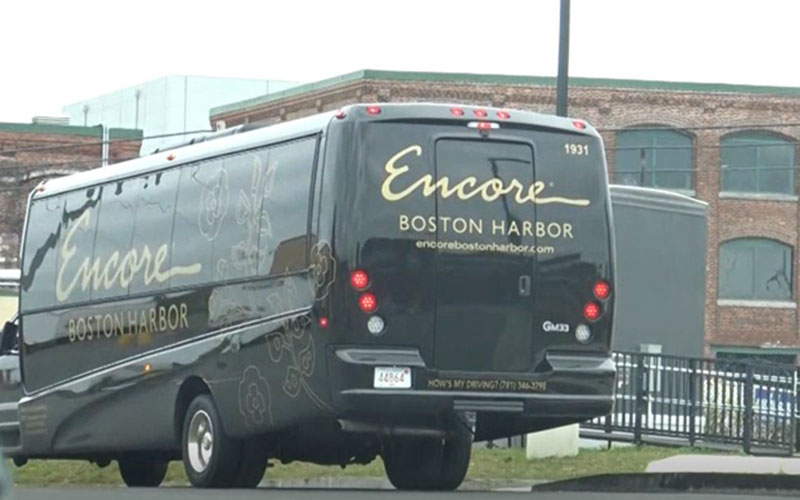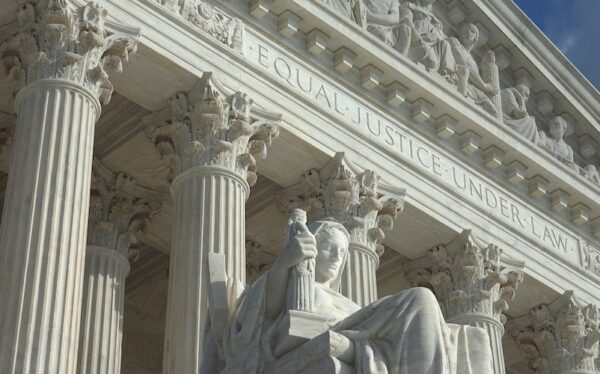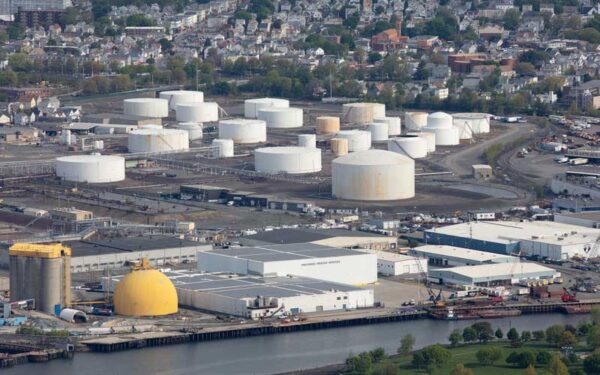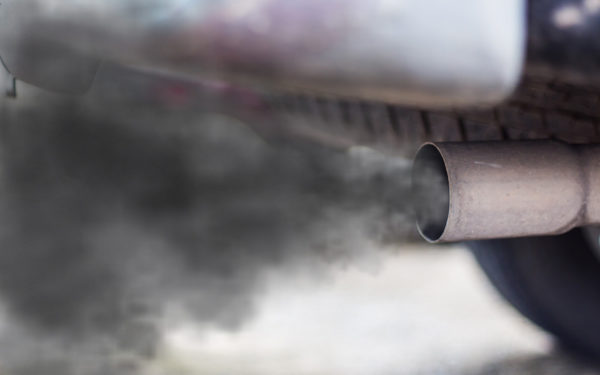
One of Encore's shuttle buses idling near a Silver Line stop in Chelsea.
Since the Encore Boston Harbor casino opened its doors in June, residents of Everett, Chelsea, and Malden have grown accustomed to a familiar sight: sleek Encore-branded luxury shuttles driving guests to and from T stations and other pick-up spots.
The idea behind the shuttles is a good one: to discourage people from taking their own cars and clogging up nearby neighborhoods with traffic and exhaust fumes. The reality, however, is that Encore’s branded vehicles consistently idle for more than 20-minute stretches near schools, parks, and homes, spewing toxic tailpipe pollution into local neighborhoods.
These are not isolated incidents. Encore shuttles idle repeatedly for long periods of time in the same spot, a pattern of harmful behavior with real consequences for air quality in Everett, Chelsea, and Malden. Buses pull up and begin idling just a few minutes after the previous bus has driven away, resulting in an almost continuous stream of exhaust. On a recent morning at one idling hotspot, people walking by were exposed to exhaust from idling Encore shuttles for more than three hours in a four-hour period.
The Encore casino is owned by Wynn Resorts, Ltd., a multi-billion-dollar company that operates glitzy casinos and resorts around the world. But powerful companies still have to follow the law. CLF has never been afraid to hold even the biggest companies accountable for threatening our environment and our health. That’s why we’ve announced our intent to sue Encore and the companies operating its shuttle buses for their illegal idling, continuing our ongoing fight for cleaner air in our communities.
CLF is enforcing idling laws and protecting our lungs
Tailpipe fumes are bad for our health – especially those from idling diesel vehicles. Exhaust contains small particles and toxic chemicals like benzene and sulfur dioxide that can cause asthma, lung damage, heart disease, multiple kinds of cancer, and even premature death. Breathing air next to cars driving by is harmful, but the emissions from idling cars are worse. When vehicles stop and idle for long periods of time, these pollutants collect in harmful clouds that people passing by inhale.
In Massachusetts, excessive idling is against the law. Our state law and the federal Clean Air Act prohibit any unnecessary idling longer than five minutes. These laws are important tools for protecting our health and that of children in our communities.
But for laws to have power, they have to be enforced. State and federal environmental regulators in New England rarely enforce these vital anti-idling laws, so CLF is stepping up and holding polluters accountable.
It’s not just Encore – we also announced our intent to sue Paul Revere Transportation, which operates private Longwood Medical and Academic Area shuttles that idle in Roxbury and private EZRide shuttles that idle at Boston’s North Station. Paul Revere is a repeat offender: they have previously paid penalties to EPA twice for breaking anti-idling laws in Massachusetts.
These new cases against Encore and Paul Revere follow on the heels of our ongoing litigation against Transdev for letting its school buses idle around the children entrusted to their care.
Everyone has the right to breathe clean air
The Chelsea, Everett, and Roxbury neighborhoods that these shuttles are polluting include low-income communities and communities of color that already suffer from poor air quality. These communities have higher rates of asthma and other respiratory illnesses that can be exacerbated by breathing in exhaust.
The idling is particularly egregious by Encore and Paul Revere shuttles waiting at MBTA stops. For those of us living in densely populated areas, the T is a lifeline. We shouldn’t have to cough our way through clouds of accumulated tailpipe fumes just to get to where we need to go. When I ride the T every day to work, to the movies, or to visit family, I shouldn’t have to worry about harming my health. People living in Chelsea, Everett, and Roxbury shouldn’t, either.
At CLF, we love mass transit. We want to see people traveling by bus or shuttle, rather than driving their own cars. But that doesn’t mean bus companies should get a pass when it comes to following the law.



